By Francesco Canepa and Balazs Koranyi
FRANKFURT (Reuters) – The European Central Bank’s top economic thinkers are sparring over the outlook for inflation and rates, leaving investors scratching their heads over the ECB’s next policy moves.
Philip Lane and Isabel Schnabel, who lead the economic debate on the ECB’s board, gave contrasting views this week on whether the euro zone central bank should scale down its interest rate increases and even on how to measure inflation.
Lane, the ECB’s chief economist, whose view is that record price growth will start to subside next year, said many arguments for another 75-basis-point rate hike were “no longer there”.
The sequential economic shocks of the COVID pandemic and energy price spike meant current inflation readings should be taken with a pinch of salt because projections show a rapid decline, he added.
Schnabel meanwhile pushed back on the notion of smaller rate hikes and took a jab at economic projections, emphasising that the longer inflation was allowed to remain high, the greater the risk that it would take root.
They were also at odds on the prospect for wages, which Lane said should be “closely monitor(ed)” for any sign of an undue acceleration while Schnabel called on the ECB to “prevent a wage price spiral” before it even happens, given that wages are moving up “up relatively quickly”.
Their apparent disagreement added to investor uncertainty about the size of the ECB’s next interest rate hike, expected in less than three weeks’ time, and on where borrowing costs may eventually peak.
Market betting has been swinging between a 50- and a 75- basis-point increase when policymakers meet on Dec. 15.
“It’s extremely exciting but predicting the ECB for a market participant has become impossible,” Carsten Brzeski, global head of macro at ING, said.
DEEP UNCERTAINTY
The ECB surprised markets with larger-than-expected rate increases in July and September and has since said it would not provide any guidance about future moves but be “data-dependent”.
That saves it from more painful changes of tack after ECB President Christine Lagarde went from all but ruling-out rate hikes this year to presiding over the steepest tightening cycle in the euro’s history.
Danske Bank economist Piet Christiansen said the December meeting will ultimately come down to November’s underlying inflation data, due out on Nov. 30.
“The hawks have been in the driver’s seat all year and it will come down to the November inflation print,” Christiansen said. “If core inflation is higher – to me core is more significant – then the doves will have a difficult time arguing for a slowdown.
The public divergence also deals another blow to Lagarde’s aim of bringing concord among the 25 members of the Governing Council after a fractious end to the tenure of her predecessor, Mario Draghi.
Unlike in Draghi’s time, where the six-person Executive Board was mostly united behind a sometimes domineering president, now the people who run the ECB are often at odds too.
Schnabel and Vice President Luis de Guindos have emphasised core inflation, which strips out volatile food and energy prices, as a key metric to watch.
But Lane said in a blog post on Friday it may “overstate” how persistent inflation may be.
Fellow board member Fabio Panetta has fought a long and largely lonely fight to get the ECB to take a gentler rate-hiking path, recently receiving support from several members of the Governing Council.
“Madame Lagarde was so keen to get the team spirit together and now even her own ECB colleagues are keen to get this fight out in the open,” ING’s Brzeski said.
The ECB is not alone in this, with Federal Reserve chair Jerome Powell perceived to be more “hawkish” than his deputy, Lael Brainard, in their public communication.
Dirk Schumacher, an economist at Natixis, found a public debate healthy but thought ECB policymakers were “bluffing” when they hinted at a peak rate of around 3%.
He estimated the ECB would need to be discussing a 5% rate if it single-handedly wanted to bring down inflation to 2%, but that this would cause too deep an economic recession.
“There’s an element of bluffing there because they know they also need to be lucky,” Schumacher said.
“Inflation is being driven by factors they can’t control,” he added, citing energy prices, geopolitical tensions and supply-chain disruptions as some of them.
(Writing by Francesco Canepa; Editing by Catherine Evans)

